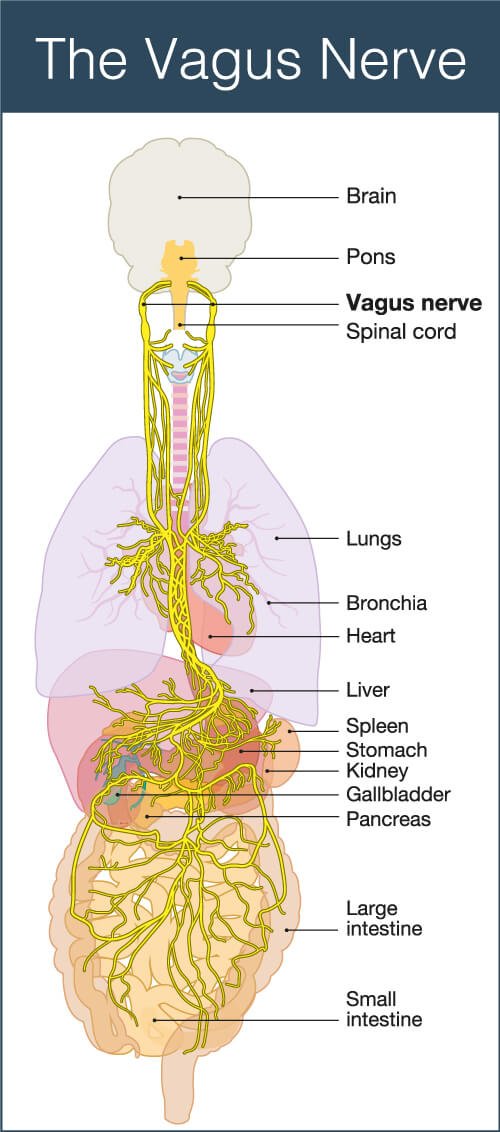Have you ever wondered how our mind and body communicate? Enter the vagus nerve, a remarkable highway connecting our brain and gut. In this blog, we will explore the vagus nerve, its role in the gut-brain connection, the polyvagal theory, and its supportive actions in managing stress, anxiety, and depression. Additionally, we will provide you with effective strategies to stimulate and enhance your vagal tone for improved well-being.

The Vagus Nerve, What is it?
The vagus nerve, also known as the tenth cranial nerve, is the longest and most complex nerve in our body. It extends from the brainstem down to the abdomen, branching out to various organs, including the heart, lungs, and digestive system. Often referred to as the “wandering nerve,” it serves as a vital communication pathway between our brain and the rest of the body, especially out gut.
The Gut-Brain Connection and Polyvagal Theory
The vagus nerve plays a pivotal role in the bidirectional communication between our gut and brain, known as the gut-brain connection. It acts as a vital link, transmitting information and signals that influence our physical and mental well-being. This connection is the explanation around symptoms such as anxiety that presents as a sore stomach, or dysbiosis that presents with brain fog or depression.
The polyvagal theory, proposed by Dr. Stephen Porges, expands on our understanding of the vagus nerve’s role in regulating our body’s responses to stress and promoting overall well-being. It suggests that the vagus nerve operates in a hierarchical manner, with three distinct branches that control different physiological and emotional states.
Supportive Actions in Managing Stress, Anxiety, and Depression
The vagus nerve is intricately involved in regulating our stress response, anxiety levels, and mood. Here’s how it supports our mental and emotional well-being:
- Stress Regulation: The vagus nerve acts as a mediator of the parasympathetic nervous system, promoting relaxation and counteracting the fight-or-flight response. Stimulation of the vagus nerve activates the relaxation response, reducing stress levels and promoting a sense of calm.
- Anxiety Management: By stimulating the vagus nerve, we can activate the body’s relaxation response, leading to decreased anxiety symptoms. Vagus nerve stimulation helps regulate heart rate, breathing patterns, and the release of calming neurotransmitters, such as GABA.
- Depression Alleviation: Studies have shown that vagus nerve stimulation can be an effective therapeutic approach for individuals with treatment-resistant depression. By modulating brain activity and neurotransmitter release, vagus nerve stimulation can improve mood and reduce depressive symptoms.
Reasons for Poor Vagal Tone: Several factors can contribute to poor vagal tone, including:
- Chronic Stress: Prolonged periods of stress can dampen vagal tone, hindering its ability to regulate the stress response effectively.
- Sedentary Lifestyle: Lack of physical activity and exercise can lead to reduced vagal tone over time.
- Inflammation and Chronic Illness: Conditions associated with chronic inflammation, such as autoimmune disorders, can impact vagal tone.
- Emotional Trauma: Past traumas can dysregulate the vagus nerve’s function and contribute to poor vagal tone.
Ways to Stimulate Your Vagus Nerve
Fortunately, we can enhance and stimulate vagal tone through various practices. Here are some effective strategies:
- Deep Breathing: Engage in slow, deep diaphragmatic breathing, focusing on extending your exhales. This activates the relaxation response and stimulates the vagus nerve.
- Meditation and Mindfulness: Regular practice of meditation and mindfulness techniques can promote relaxation, reduce stress, and support vagal tone.
- Yoga and Tai Chi: These practices combine movement, breathwork, and mindfulness, promoting relaxation and activating
- Singing and Chanting: Vocal exercises like singing or chanting can stimulate the muscles of the throat connected to the vagus nerve.
- Cold Exposure: Taking cold showers or splashing cold water on your face can trigger the mammalian dive reflex, activating the vagus nerve and promoting relaxation.
- Social Connection: Positive social interactions and meaningful connections with others can stimulate the vagus nerve and boost overall well-being.
The vagus nerve is an incredible bridge connecting our gut and brain, influencing our physical and mental health. Understanding its role in the gut-brain connection and adopting practices to stimulate and enhance vagal tone can lead to improved stress management, reduced anxiety, and alleviation of depression. Embrace these powerful techniques, and unleash the potential of your vagus nerve to experience a harmonious and balanced life.


















